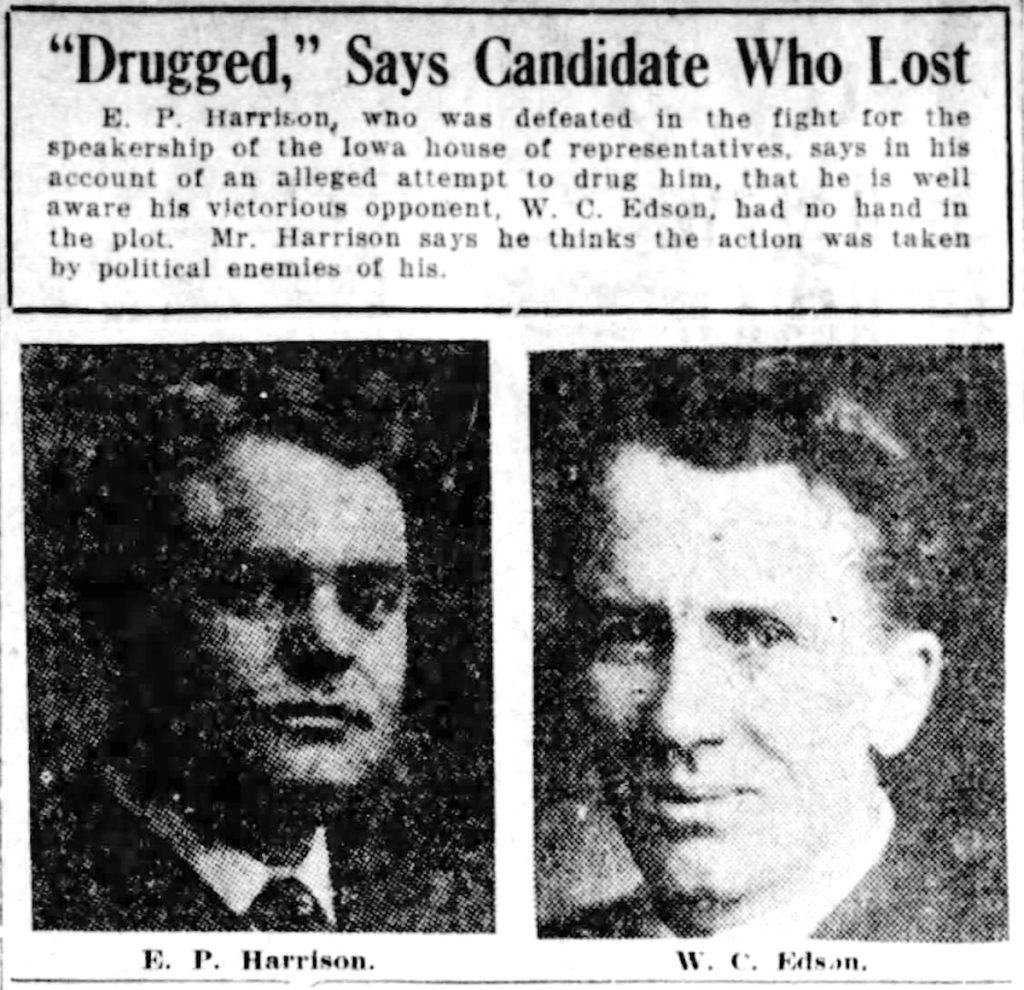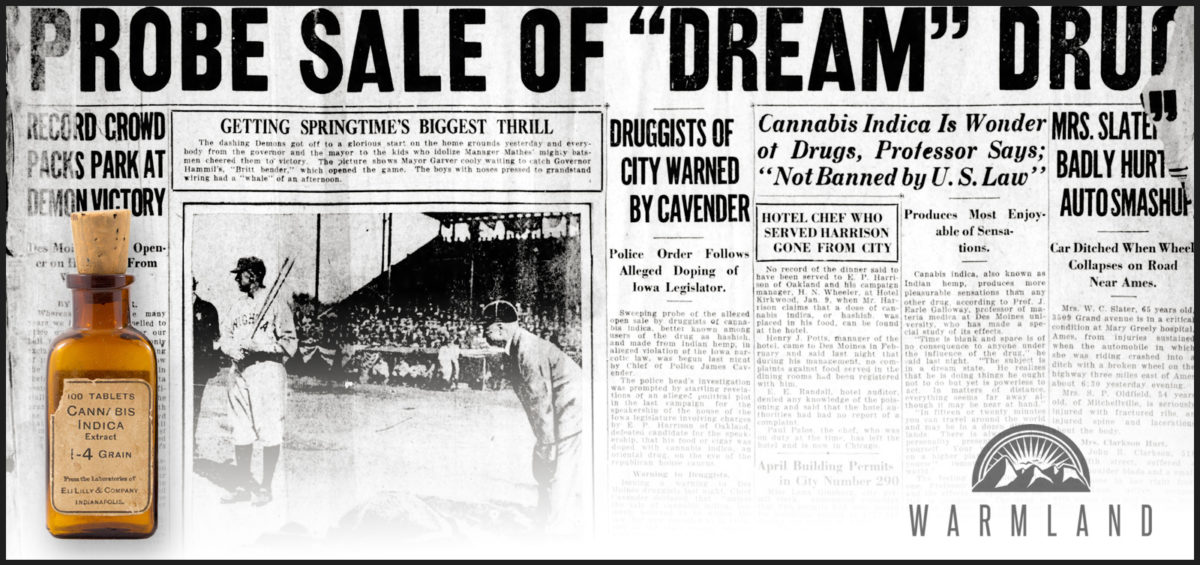In Des Moines, Iowa, during the early 1920s, cannabis was being sold at every pharmacy in the city. It came “in extract, powder or semisolid, or liquid form” and was available to anyone willing to register their name and address with a druggist. However, when state politician E. P. Harrison blamed an overdose for his failed 1925 bid for the speakership of the house of the Iowa legislature, police suddenly cracked down hard.

Harrison claimed that, while dining at the Hotel Kirkwood, his food or cigar had been “doped with cannabis indica… an unscrupulous activity of unknown political enemies.” After dinner on the last day of the campaign, he had “lost all interest in affairs;” the following day, “while still under the influence, he withdrew from the race a few moments before the republican house caucus was called to order.”
A thorough investigation by narcotics officers and local police uncovered no evidence of any “political plot” (the claims were later denounced as “pure and unadulterated bunk”), but the incident drew attention to the “confusion concerning the legality of its sale.” Police chief James Cavender discovered that he had been given “erroneous information by attorneys” and promptly issued a stern warning to all the shops:
“Unless the sale of cannabis indica, formerly believed to be within the law, but now revealed as in violation of the state statute dealing with narcotic drugs, is immediately halted, an ‘under cover’ investigation will be started and druggists found to be selling it to Americans will be prosecuted to the full extent of the law.”
Prof. J. Earle Galloway, professor of material medical at Des Moines university, lamented the crackdown. He had made a “special study” of cannabis, discovering that “the effects of opium are sottish in comparison.” Pointing out that cannabis was still “not classed under the federal narcotic law,” he insisted that it was the “wonder of drugs… producing more pleasurable sensations than any other drug.”
Probe Sale of “Dream” Drug
The Des Moines Register, May 1, 1925
Druggists Of City Warned by Cavender
Police Order Follows Alleged Doping of Iowa Legislator
Sweeping probe of the alleged open sale of druggists of cannabis indica, better known among users of the drug as hashish, and made from Indian hemp, in alleged violation of the Iowa narcotic law, was begin last night by Chief of Police James Cavender.
The police head’s investigation was prompted by startling revelations of an alleged political plot in the last campaign for the speakership of the house of the Iowa legislature involving charges by E. P. Harrison of Oakland, defeated candidate for the speakership, that his food or cigar was doped with cannabis indica, an oriental drug, on the eve of the republican house caucus.
Warning to Druggists
Issuing a warning to Des Moines druggists last night, Chief Cavender declared that “unless the sale of cannabis indica, formerly believed to be within the law, but now revealed as in violation of the state statute dealing with narcotic drugs, is immediately halted, an ‘under cover’ investigation will be started and druggists found to be selling it to Americans will be prosecuted to the full extent of the law.”
Easy to Buy Here
Chief Cavender declared he does not believe Des Moines druggists are aware that the drug is outlawed by the state code and for that reason will give them notice before conducting a campaign “under cover.”
The drug is not included in the Harrison federal drug act and for that reason much confusion has resulted concerning the legality of its sale.
Local druggists have been selling cannabis indica without question, it is said.
A Register reporter experienced little difficulty in obtaining a small quantity of the drug at a downtown drug store last night.
It was necessary for the reporter to give his name and address before he was able to purchase the cannabis indica, the drug being listed a poison.
Chief Cavender launched an inquiry into the sale of cannabis indica when he first took over the police department but was given erroneous information by attorneys that the Iowa code permitted sale of the drug, and the investigation was halted, he said.
Harrison, who withdrew from the race a few moments before the republican house caucus was called to order in Hotel Savery to unanimously choose W. C. Edson of Storm Lake, reported to Des Moines police that he had been doped the night before, Inspector Carl Vonn of the detective bureau admitted yesterday.
Alleged Doping
Neither the Des Moines detective force nor the federal narcotic bureau could substantiate Harrison’s charges and they were dropped after thorough investigation.
Mr. Harrison, interviewed at his home yesterday, is still convinced that he was doped, although the investigation netted no confirmation of his suspicion.
The only possible motive he can assign is unscrupulous activity of unknown political enemies.
Harrison absolved his opponent, Edson, from any connection whatever with the alleged doping.
The alleged doping of Harrison was charged by him to have occurred while he ate dinner Friday night, Jan. 9, at Hotel Kirkwood in company of his campaign manager, H. N. Wheeler. This was the night before the speakership was to be decided.
After he had eaten, Harrison reported to Vonn, he smoked a cigar and shortly afterward became somewhat drowsy and lost all interest in affairs, including the speakership.
While still under the influence of the narcotic, Harrison told Vonn, he withdrew from the speakership contest the next morning.
Hotel Chef Who Served Harrison Gone from City
No record of the dinner said to have been served to E. P. Harrison of Oakland and his campaign manager, H. N. Wheeler, at Hotel Kirkwood, Jan. 9, when Mr. Harrison claims that a dose of cannabis indica, or hashish, was placed in his food, can be found at the hotel.
Henry J. Potts, manager of the hotel, came to Des Moines in February and said last night that during his management, no complaints against food served in the dining rooms had been registered with him.
E. E. Randall, hotel auditor, denied any knowledge of the poisoning and said that the hotel authorities had had no report of a complaint.
Paul Palos, the chef, who was on duty at the time, has left the hotel and is now in Chicago.
Cannabis Indica Is Wonder of Drugs, Professor Says; “Not Banned by U.S. Law”
The Des Moines Register, May 1, 1925
Produces Most Enjoyable of Sensations
Cannabis indica, also known as Indian hemp, produces more pleasurable sensations than any other drug, according to Prof. J. Earle Galloway, professor of material medical at Des Moines university, who has made a special study of its effects.
“Time is blank and space is of no consequence to anyone under the influence of the drug,” he said last night. “The subject is in a dream state. He realizes that he is doing things he ought not to do bot yet is powerless to act. In matters of distance, everything seems far away although it may be near at hand.”
“In fifteen or twenty minutes you can travel around the world and may be in a dozen different lands. There is always a dual personality present, you and yourself. Your whole being is on a higher plane and you see yourself removed from the world.”
The feeling is a pleasurable one, Professor Galloway stated, and the effects of opium are sottish in comparison. The drug is greenish in color and can be purchased in extract, powder or semisolid, or liquid form.
The drug can be purchased in any drug store, according to Professor Galloway, and is not classed under the federal narcotic law. It could be placed in food without the knowledge of someone eating it, he said, as in certain combinations it is tasteless.



